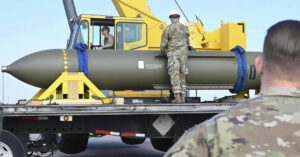The Webinar – The State of Global Energy – is this Friday!
Peter will deliver his analysis and forecasts for regional energy production and his assessment of geopolitical risk—everything from war, to instability and regulatory risk—with an eye on challenges and opportunities facing global production and supply.
Please join us on Friday, May 10th at 12:00 PM EST.
The Japanese have looked into their crystal ball and figured out that a close relationship with the Americans is the only way forward. Before Japan is welcomed in with open arms, they’ll have to prove their worth…
Between trade issues, economic challenges, and demographic crisis, it makes sense that Japan wants to join the AUKUS group (a defense focused coalition made up of the US, the UK, and Australia).
Japan has some big changes to make. While their naval capabilities are solid, they have to make the cultural and political shift toward taking a more active role for themselves and their region. They also lack real world combat experience and have plenty of cybersecurity concerns to overcome. I wouldn’t expect to see the green light anytime soon, but eventual collaboration looks to be in the cards.
Here at Zeihan On Geopolitics we select a single charity to sponsor. We have two criteria:
First, we look across the world and use our skill sets to identify where the needs are most acute. Second, we look for an institution with preexisting networks for both materials gathering and aid distribution. That way we know every cent of our donation is not simply going directly to where help is needed most, but our donations serve as a force multiplier for a system already in existence. Then we give what we can.
Today, our chosen charity is a group called Medshare, which provides emergency medical services to communities in need, with a very heavy emphasis on locations facing acute crises. Medshare operates right in the thick of it. Until future notice, every cent we earn from every book we sell in every format through every retailer is going to Medshare’s Ukraine fund.
And then there’s you.
Our newsletters and videologues are not only free, they will always be free. We also will never share your contact information with anyone. All we ask is that if you find one of our releases in any way useful, that you make a donation to Medshare. Over one third of Ukraine’s pre-war population has either been forced from their homes, kidnapped and shipped to Russia, or is trying to survive in occupied lands. This is our way to help who we can. Please, join us.
TranscripT
Hey everybody. Peter zeihan here coming to you from Colorado. Today we’re going to talk about the recent batch of up to up meetings between the Japanese and the Americans. In mid-April, we had a very large number of contacts up to and including Japanese Prime Minister Kushida, as well as, US President Biden. at issue is the Japanese are angling for a much closer relationship.
So the back story Japan in the 80s up until the 80s was a huge trade country, but then they had a demographic bomb and a debt crisis at the same time. And over the next 30 years, their competitiveness basically tanked. And so they spent the next 30 years. I don’t want to say gutting, but changing the way their industrial processes worked with as much of the manufacturing as possible.
Closer to the end, consumers in countries that didn’t face a demographic bomb. And in doing so, they went from one of the most trade weighted heavy countries in the world to one of the least involved with today, only about 10 to 15% of GDP based on where you draw the line. comes from international trade in any meaningful way.
Toyota says, you know, we build where we sell, and that has basically become the national motto. Now, that requires a degree of openness in the country that you’re trying to sell it. And so when the Japanese over the last 20 years saw the United States becoming more and more isolationist when it came to its economic issues, they’re like, wow, we need to we need to get ahead of this.
So they reached out to none other than Donald Trump and cut a trade deal from the Japanese point of view, was borderline humiliating. But they knew that that was the price to pay for a long term strategic and economic relationship. And in the aftermath of Trump’s fall, the leadership of Japan has been to the United States to make it clear to Joe Biden that unlike a lot of the other countries that signed trade deals with the Trump administration, Japan wasn’t looking for any changes.
Something that the Biden administration greatly appreciated anyway. So with that in your back pocket, we can now talk about the relationship moving forward. specifically, the Japanese are angling for membership in a group called Aukus, which is Australia, the United Kingdom and the United States, countries that are now pooling parts of the defense budget. And a lot of the defense technology to build a new generation of weapons.
the Australian specifically will get out of this nuclear attack subs and medium range air launch cruise missiles, which are, you know, very blimey. And it will tighten what is basically already one of the the tightest security relationships among any three countries in the world. the Japanese would like to get into that. and if you look at what the primary concerns of the anchor steel is China, you can see how that would be a really, really nice fit.
but it’s not going to happen in the near term. Three problems. Number one, culture after World War two, when the Japanese were recovering from those twin atomic blasts. The Japanese made the very serious and probably very correct decision that we never want to be in a position again where we might even theoretically, be on the wrong side of the United States.
So we have to have a Navy. We’re an island country. We don’t have a good land network because it’s so mountainous. We have to have a navy just for, normal commerce, maritime for us anyway. And so we’re going to have a naval force. And even today, the Japanese are the second most powerful navy in the world.
But we have to make sure that that’s cast in a way that will never make the Americans ever blink, that we might be anything other than an ally that does as it’s told. that worked during the Cold War, that worked in the post-Cold War era. But it’s not going to work now, because if the Japanese are going to be part of an alliance with the Australians, the Brits and the Americans, then they need to take some initiative on themselves.
They need to patrol their own zones. They need to contribute to the greater whole. And that requires a lot more aggressiveness, and especially a culture of having a military that is not looked down on. Basically, in Japan until recently, if you went into the military because people thought that you couldn’t do anything else. that needs to change, because the Japanese do have one of the most technologically advanced systems in the world.
So, number one, culture cringe. number two. Experience. Part of being a pacifist. No matter what your equipment looks load looks like means that you don’t shoot. And so, since 1945, the Japanese functionally have had no combat experience. And this is going to sound really weird. The war on terror for a lot of countries was an opportunity to get experience interfacing with the United States and get limited combat experience on an issue that, for them was not really top tier.
So, you know, if something went disastrous, there might be some political fallout, especially with the Americans. But it’s not like Japan would face a threat to the home islands from Al-Qaeda. Well, now that the Americans have wrapped up the war on terror, that opportunity, if that’s the right word, is gone. And the Japanese, if they want to look around and get some practice, you know, you got the Russians and the Chinese, but if there’s a fight with them that is not small scale, that does not have a low risk.
so it’s not clear how. Aside from drilling, drilling, drilling, drilling with your own forces, with the Americans, with Australia, it’s not clear how they can get that experience before they get to a real fight. The third problem, luckily, is something that is a little bit more short term and a little easier to fix, and that’s cybersecurity. If you are a pacifist and if you believe that military activity is passé.
Well, you don’t really worry about your information control. And I would argue that aside from the Chinese, where a lot of cryptography is functionally illegal, so the government can hack its own population. The Japanese people are probably the most hacked people on the planet. That’s got to change if they’re going to be part of any sort of deep information and technical sharing, because nobody wants to develop a new nuclear submarine.
Share the plans with the Japanese and you see it on TikTok the next day. Luckily, there’s plenty of ways to get experience combating that, and I have no doubt that the Japanese are already working on multiple cylinders in order to get that experience built up. But still, that’s not something you do in three months or six months, or nine months or 12 months.
It’s also your process. So will this happen in some version? I think almost guaranteed. But the question is how fast can the Japanese make? The changes are going to be necessary so that the rest of their would be allies are willing to trust them? That’s not the case here.








